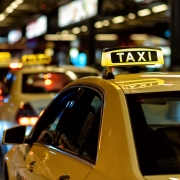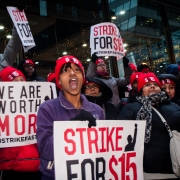How Crony Capitalism Ruins Free Market Competition
Imagine, for a moment, that you are a runner preparing for a race. You know that in order to beat the competition, you are going to have to train as hard as you possibly can in order to be the best you can be. You sacrifice your free time to hit the gym and workout, give up all unhealthy foods to be in peak physical condition, and when the day of the big race finally comes, you feel prepared and confident in your abilities.
And all this hard work makes crossing the finish line ahead of the rest feel even better than you imagined because you know you put forth your best effort. But just as you are about to be awarded your cash prize for all your hard work, the judges tell you that your win was unfair. “The other runners were not as prepared as you were,” the judges claim. “It’s unfair that you should win when others didn’t have the training that you had.”
And after talking amongst themselves, the judges decided that the only way to make this race fair for everyone is to demand that your prize money be split up among the other runners so that they may pay for gym memberships, healthier food, or whatever ever else they may need in order to “level the playing field” for future races.
This, of course, would never happen. If it did, there would be massive outrage as this type of action would negate the entire purpose of competitions altogether. No one should have to pay to strengthen their competitors and give them a leg up in the competition. And yet, in the business world, this happens all the time.
Cronyism in Massachusetts
Just a few years ago, Massachusetts became the first state to force a company to help fund its competition. Levying a five-cent-per-ride on companies like Lyft and Uber, the revenue collected from this tax goes directly towards subsidizing the traditional taxi companies that operate within Massachusetts.
Kirill Evdakov, Chief Executive of the Boston-based ridesharing service Fasten, commented on this matter, saying, “I don’t think we should be in the business of subsidizing potential competitors.” Kirill is absolutely right: forcing ridesharing services to subsidize the taxi industry, which has been trying to regulate businesses like Fasten into nonexistence, is not only unheard of, but completely ridiculous.
The law is justified by saying the revenue will go towards helping the traditional cab companies create “new technologies and advanced service, safety and operational capabilities.” In other words, this new tax will be used to help cab companies achieve what ridesharing services have been able to do without any access to subsidies.
Though only five cents per ride will be going to the traditional taxi industry, the new law will actually place a 20 cent tax on ridesharing companies overall. The remaining 15 cents will be divided, with 10 cents going to the city where the service is operating, and the other five cents going towards a “state transportation fund.”
While subsidizing the taxi industry is easily the worst aspect of these regulations, giving a portion of this tax to the cities is going to make it harder to repeal or reform these types of regulations later, after local governments become accustomed to receiving this money.
In Massachusetts, ridesharing companies are responsible for 2.5 million rides per month. Those benefiting from this new tax stand to make millions of dollars from this regulation, something Massachusetts city governments are sure to be happy about receiving.
Competition Makes Everything Better
The government should never be responsible for picking losers and winners. The taxi industry has failed to evolve and innovate over the years, which has allowed ridesharing services to fill a void in the market. Instead of being praised for their success, ridesharing services are being punished while taxi industries are being rewarded for failing to innovate.
We recognize how silly this practice would be in the realm of sports, but for some reason when it comes to business, many champion these policies. But just like athletic competition makes us better and stronger, so does market competition. The only reason we have Uber and Lyft is because someone saw the shortcomings of the taxi industry and thought, “I can make this better.” Imagine how much better ridesharing would be if the taxi industry tried to make the Uber model even better.
But instead, the losing entities use governments to inhibit and steal from their competitors. In a truly free market, consumers would vote with their dollars, thus choosing the winning entity. Only consumers should be trusted with this decision, not governments. Hopefully, Massachusetts serves as a cautionary tale.













